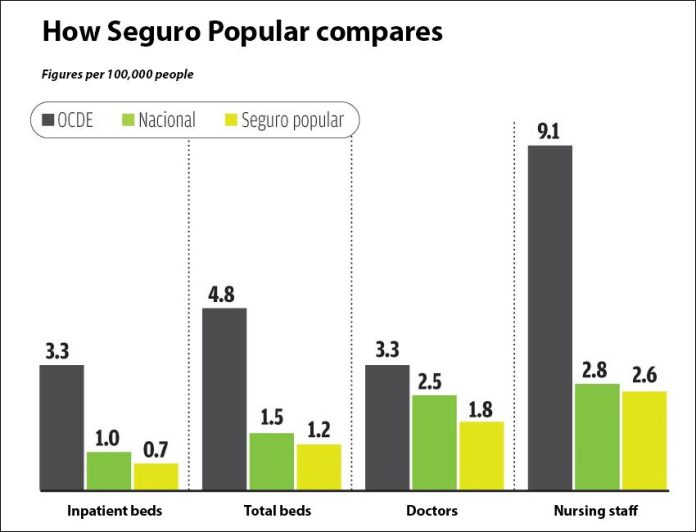More than 16 billion pesos (US $852 million) in federal health care funding that was transferred to state governments between 2013 and 2017 is unaccounted for, audits show.
The newspaper Milenio reviewed audits conducted by the Federal Auditor’s Office (ASF) and found a range of irregularities in the use of funds allocated to the Seguro Popular health care program.
They include overpayments for medications, payments for which no records exist, unauthorized transfers of funds and the inclusion of phantom employees on payrolls.
In 174 investigations into the use of Seguro Popular funds, six alone — in just four states — represented diversions totaling 53.3% of the total.
The Veracruz state government was by far the worst offender, allegedly illegally diverting almost 4.1 billion pesos (US $217 million).
Former governor Javier Duarte, who was sentenced last month to nine years in prison for money laundering and criminal association, was in office from 2010 to 2016.
Investigations uncovered a range of medical irregularities during his administration including that of a state-run cancer clinic that gave distilled water instead of chemotherapy medication to several children.
The next biggest alleged embezzlements occurred in Michoacán, Jalisco and Oaxaca, where a combined total of around 3.6 billion pesos (US $192 million) is unaccounted for.
According to the ASF, law enforcement authorities have identified those believed to be responsible for 3 billion pesos of the missing money and have begun processes to attempt to recover it.
However, none of those resources have yet been recovered and those responsible for the diversion of the other 13 billion pesos have not been identified.
Since the current federal government took office in December 2012, it has managed to recover 782.4 million pesos (US $41.7 million) in Seguro Popular funds detected as missing while the use of 5.2 billion pesos — on top of the 13-billion-peso amount — whose use had been questioned has now been accounted for.
But the magnitude of the alleged corruption that has taken place within the Seguro Popular health care program remains enormous.
The public system provides medical coverage for 55 million Mexicans who have no other health insurance, including 22 million people who earn less than twice the minimum wage (176 pesos or around US $9 per day): in other words, the nation’s poorest people.
Statistics show that the number of doctors, nurses and other medical personnel working in the Seguro Popular system is below both OECD levels and those for Mexico as a whole, while medicine shortages have occurred in several states.
Corruption is suspected of being a significant factor behind the system’s shortcomings and there is evidence that its consequences can be fatal.
Catarino Escobar, a 65-year-old Guanajuato resident who didn’t have a job in the formal economy, was one of the millions of Mexicans who depend on Seguro Popular for their health care needs.
In June, Escobar suffered his third heart attack and was taken to the Dolores Hidalgo General Hospital, which treats Seguro Popular patients. But soon after his arrival it became apparent that the hospital was not equipped to treat him.
“Take your dad [to another hospital], we don’t have the medication or the catheter that he needs,” the treating physician told Escobar’s son Antonio.
However, the family didn’t have the financial means to pay for his treatment elsewhere and a few days later, having never received the treatment or medication he needed, he died.
“Here, that well-known phrase applies,” Antonio said. “Corruption kills.”
Source: Milenio (sp)
